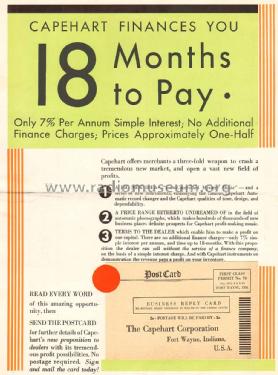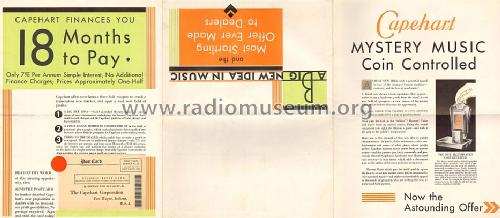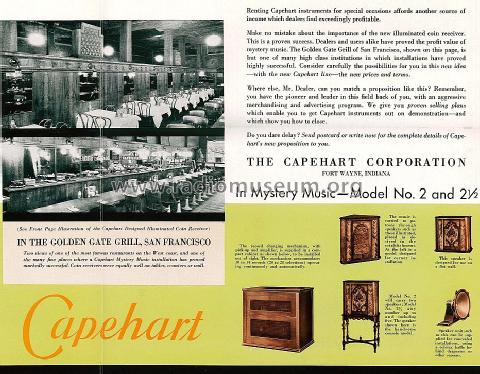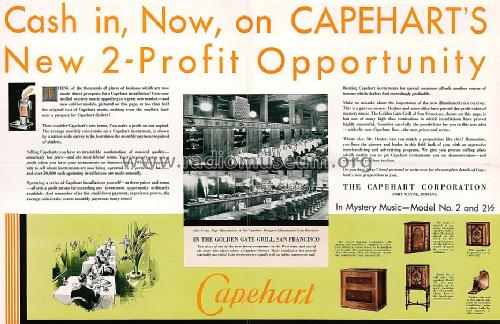Orchestrope 11
Capehart Corp.; Fort Wayne, IN - see also Farnsworth
- Produttore / Marca
- Capehart Corp.; Fort Wayne, IN - see also Farnsworth
- Anno
- 1930/1931
- Categoria
- Registratore audio/video e/o riproduttore
- Radiomuseum.org ID
- 227924
- Principio generale
- Amplificatore audio
- Gamme d'onda
- - senza
- Particolarità
- Jukebox o fonografo con funzionamento a moneta
- Tensioni di funzionamento
- Alimentazione a corrente alternata (CA) / 60 cycles (separate order for 25 or 50 cycles), 110 Volt
- Altoparlante
- AP elettrodinamico (bobina mobile e bobina di eccitazione/di campo)
- Materiali
- Mobile in legno
- Radiomuseum.org
- Modello: Orchestrope 11 - Capehart Corp.; Fort Wayne, IN
- Forma
- Console, con gambe d'appoggio basse (< 50%).
- Dimensioni (LxAxP)
- 49 x 45 x 23.5 inch / 1245 x 1143 x 597 mm
- Annotazioni
-
Orchestrope 11 (coin slot at the right)
Walnut cabinet. See this video from Bob for the playing mechanism of a similar Orchestrope.
The Orchestrope is the first product of then called "Capehart Automatic Phonograph Co.", which company lasted only one year and had then to be financed as Capehart Corporation (moved to Fort Wayne, IN). The model was made with a coin slot except at least "Aristocrat". Difference between 28-G and 28-F is for instance coin box on top for the 28-F model. 250 type amp is possible instead of amp. 245 - for two speakers, for instance the model 600 outdoor twin speakers.The coin operated machine is capable of holding 28 records. There is no selection. It is a continuous play of the slack in place, all 56 sides. In those pioneering days, Capehart favored a changer that drags records across the mechanism, to get them to the turntable, and away from it. It has a springwound phonograph but it is wound by an electric motor. The same electric motor drives the changer mechanism. The springwound mechanism was made for the poor electricity supply at that time - to keep the speed straight.
There are several early models of Orchestrope known like: Club, Commercial (wide), Commercial (high), Commercial 28 as 28-F, (perhaps 28-G) and 28-GB, Auditorium with a separate Orchestrope Speaker, Aristocrat without coin slot, Home and the "Park" with a separate speaker cabinet, Speaker 600.
In March 1930 came a less expensive Amperion line with a simple turning changer, followed by models with the drop-type only "10-12" mechanism in 1931. The main success was later the changer 16-E etc. - see more details and summaries here.
- Fonte dei dati
- Pre-War Consoles
- Autore
- Modello inviato da Ernst Erb. Utilizzare "Proponi modifica" per inviare ulteriori dati.
- Altri modelli
-
In questo link sono elencati 262 modelli, di cui 153 con immagini e 119 con schemi.
Elenco delle radio e altri apparecchi della Capehart Corp.; Fort Wayne, IN - see also Farnsworth








